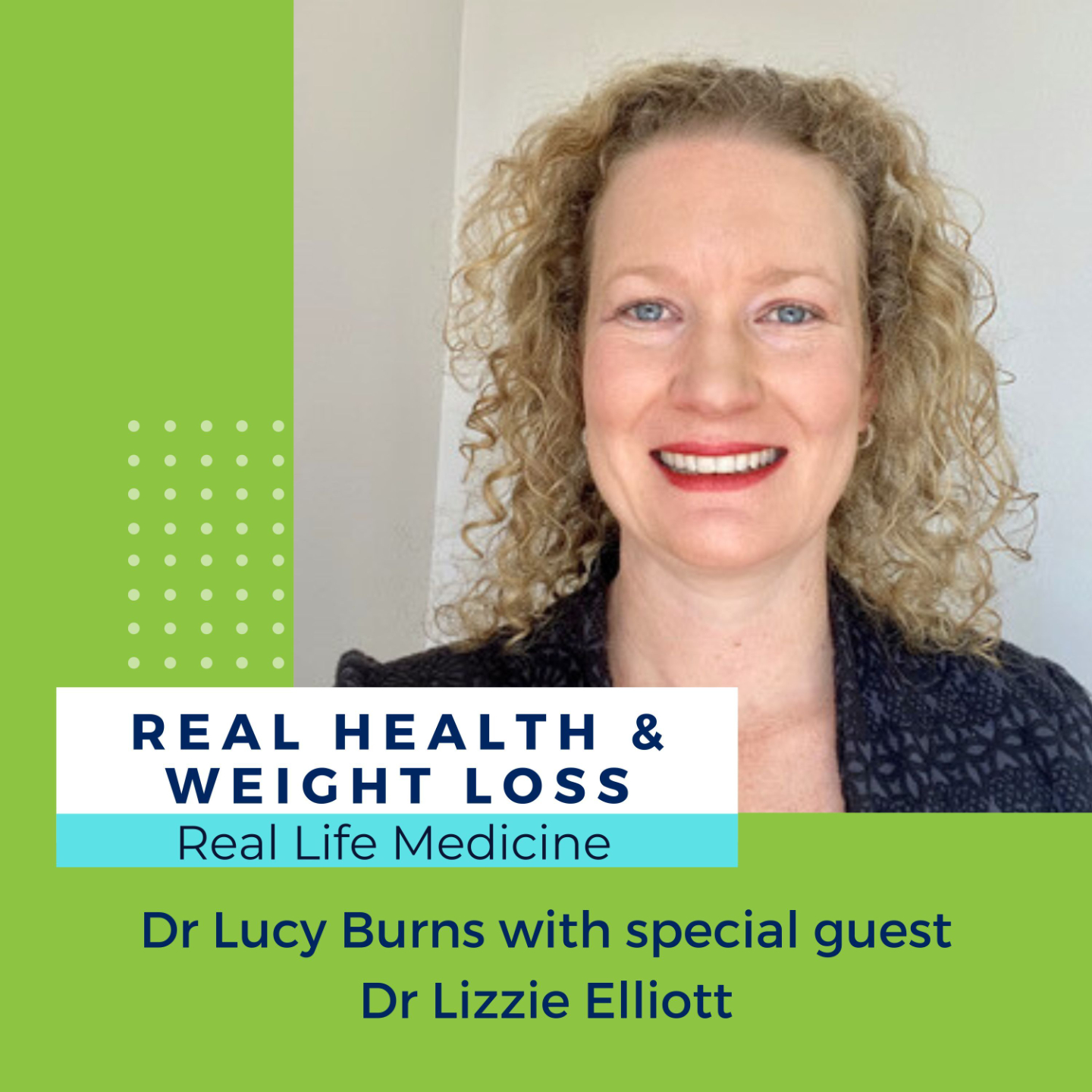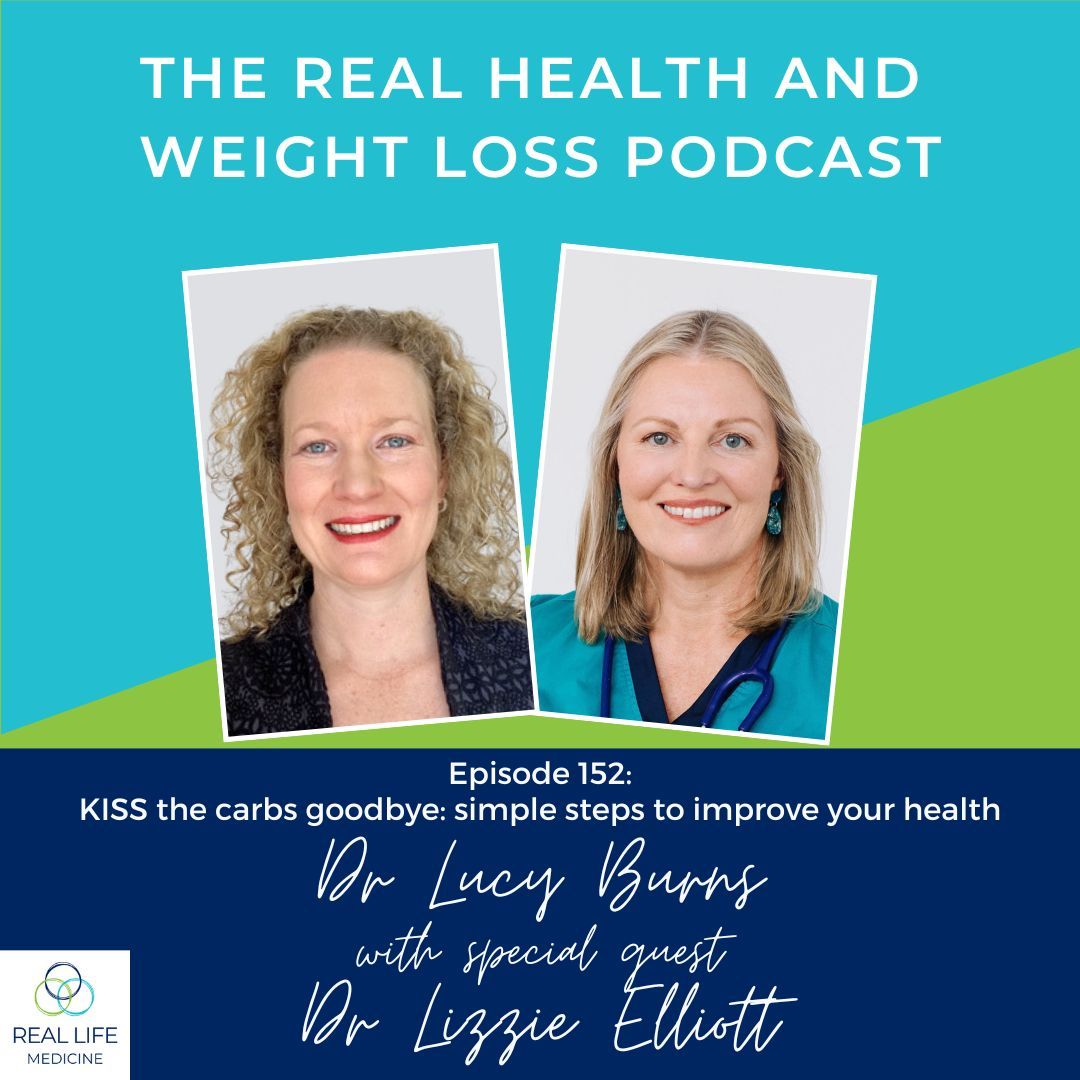
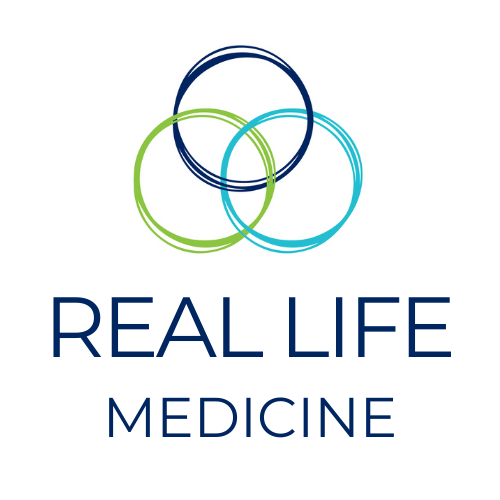
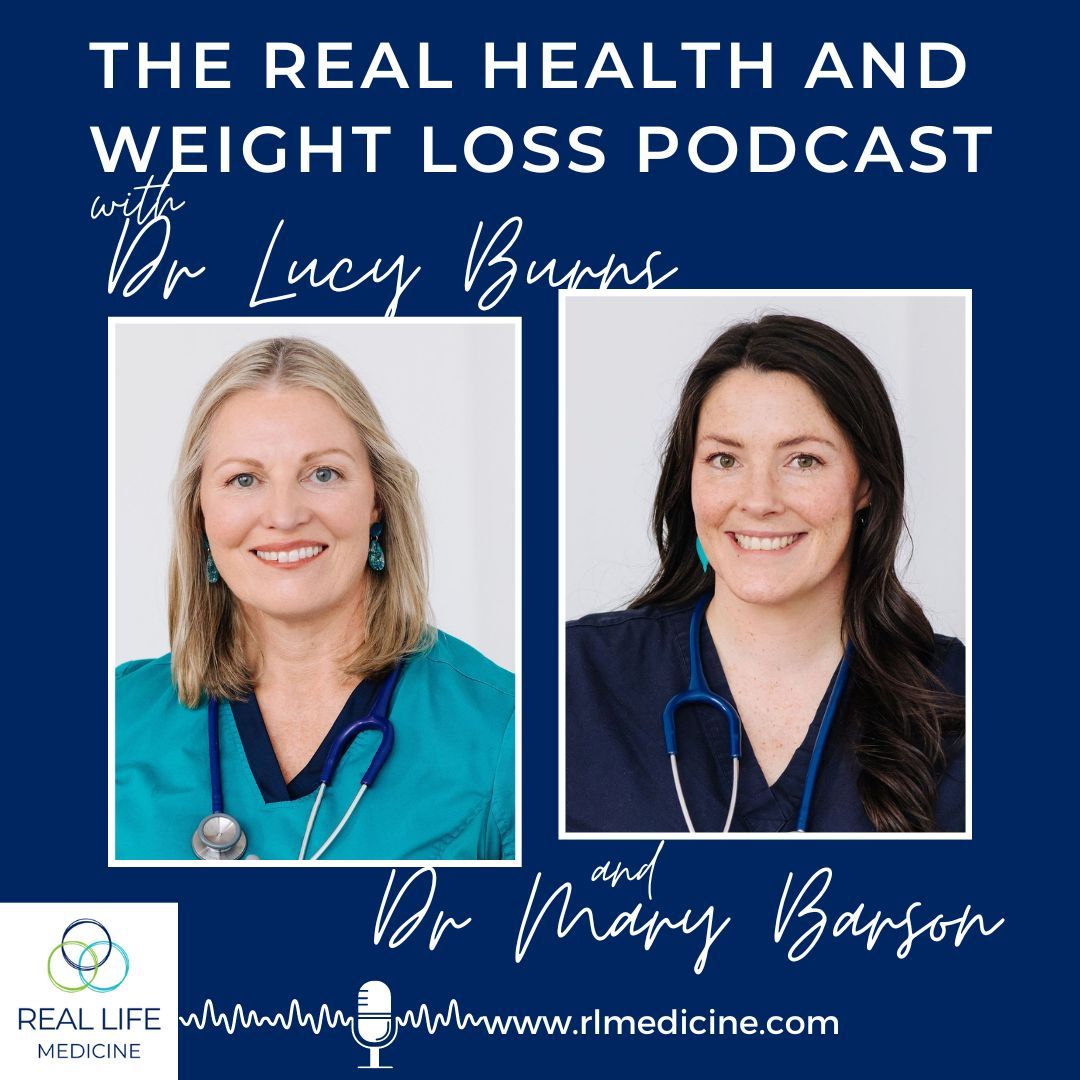
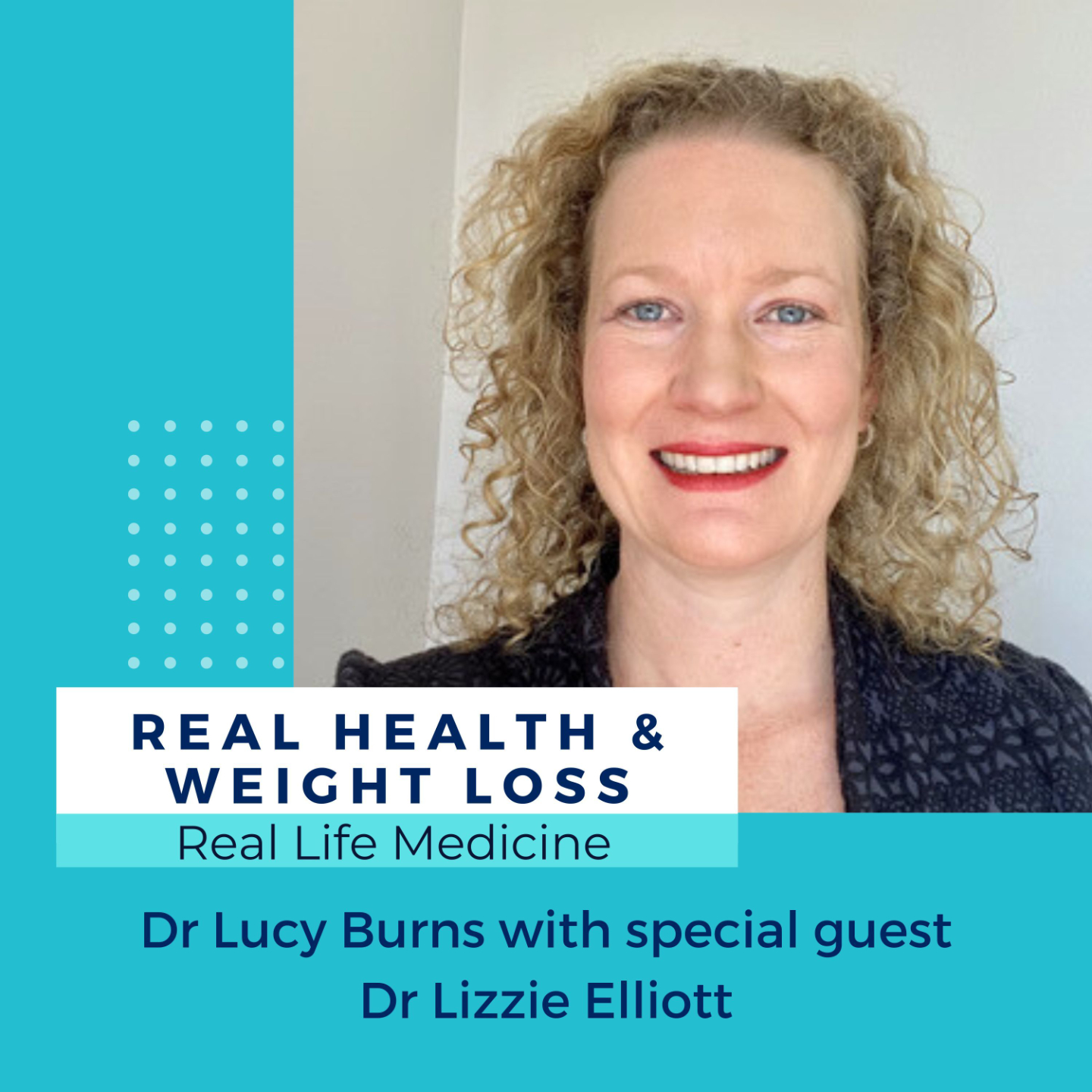
Episode 152: Show Notes
Expanding the toolbox: Dr Lizzie Elliott wanted to add to her medical practices by having a range of strategies and referral pathways for her patients and this led her into the realm of nutrition and lifestyle medicine. The low carb script for health has brought amazing and sustainable results to Dr Lizzie’s patients, along with addressing physical activity, sleep, stress management, community connectedness and reducing substance addictions. A common theme amongst doctors who add low carb nutrition to their professional toolbox is the reignition of joy in their work and excitement about the future. This is in contrast to many other medical practitioners who are experiencing burnout and dissatisfaction, and are leaving the field.
Ultra processed food, cigarettes and alcohol: Dr Lizzie has become adept at analysing and interpreting nutrition studies and has integrated this science into her medical treatment. The detrimental effects of ultra processed foods on health are well documented and even though the immediate toxicity may not be apparent, the cumulative impact over time is undeniable. The harm caused by putting these products into our bodies is on par with the harm caused by cigarettes and alcohol.
Real food is medicine! There are sceptics and vested interests who criticise the concept that real food can be a powerful form of medicine, likening it to the wellness wankery realm inhabited by people like Gwyneth Paltrow. We know this is not the case. Real food is medicine!
Calories in, Calories out: The outdated mantra of ‘calories in, calories out’ disregards the actual nutritional value of foods, focussing only on the energy value which is calculated by burning food and assessing the change in temperature as this happens. We are not machines that set fire to our food for fuel and the simplistic caloric model disregards the intricate hormonal and enzymatic processes that impact how the body utilises different nutrients.
Keep it Simple Stupid (KISS) principle: Dr Lizzie advocates ditching the complexity of following specific diets, instead suggesting adopting a blanket rule of reducing carb intake. Significant improvements in symptoms can be achieved by doing this! Try swapping toast for eggs, having salad with protein and olive oil instead of a salad sandwich, reducing high carb foods like potatoes, pasta, and rice, and adapting to hot drinks without sugar. This approach is not about immediate perfection but focuses on making gradual improvements that are sustainable over time.
Self reflection: Keeping a food diary as a tool for self reflection, instead of the old school food diary used for tracking food based on calorie limits or points, helps correlate food choices with how you feel physically and emotionally. The importance of reconnecting with our body and being aware of how certain behaviours, such as food choices or sleep quality, impact overall well being can help you reconnect with a self awareness that is often neglected in the weight loss world. Reconnect with yourself. Reconnect with real food. These are the keys to sustainable and real health and weight loss.
To hear Lizzie speak at Low Carb Road Show Hobart:
https://www.rlmedicine.com/the-low-carb-road-show-hobart
Buy your tickets to Low Carb Road Show Hobart to hear Lizzie in person!
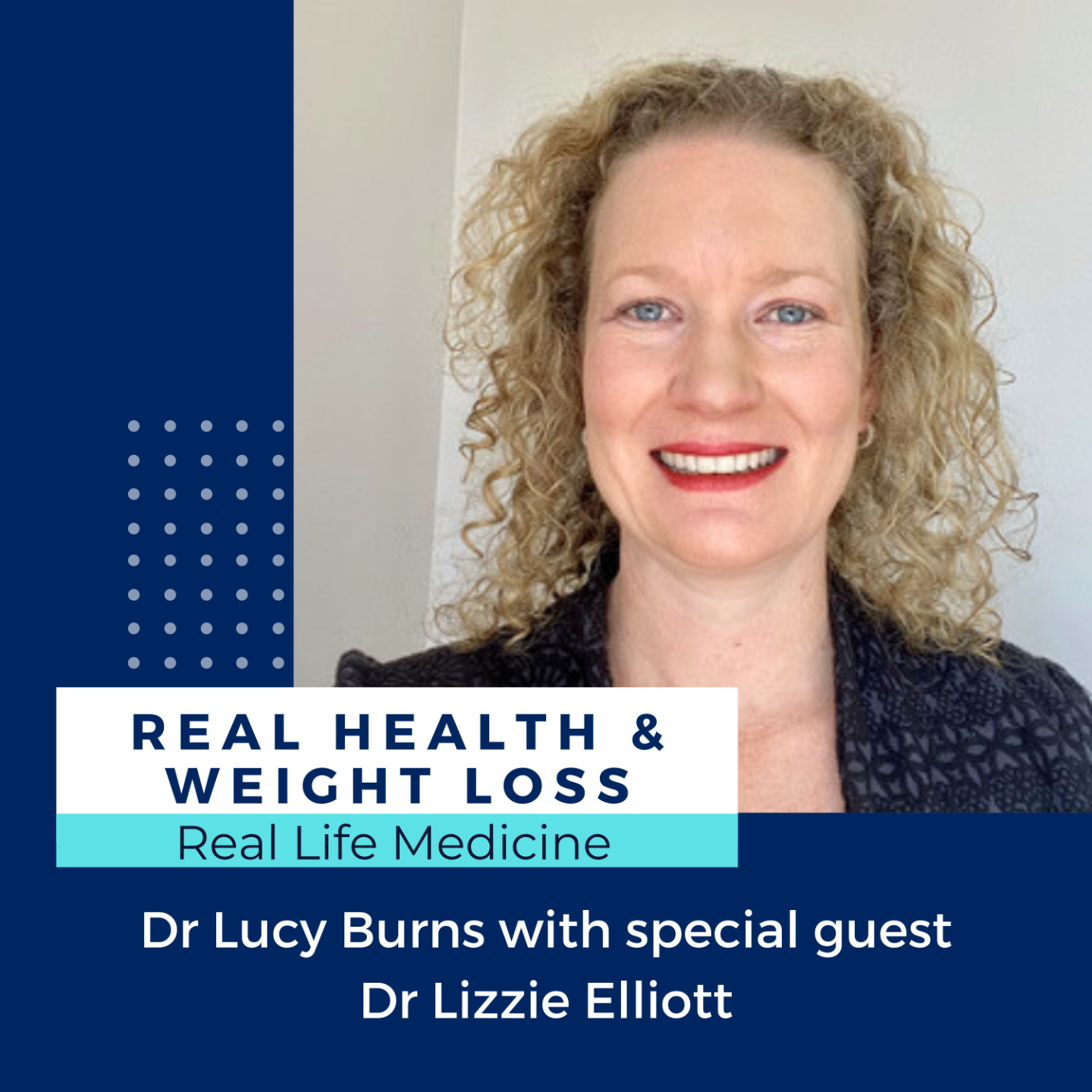
Transcription:
Episode 152
Dr Mary Barson: (0:11) Hello, my lovely listeners. I'm Dr Mary Barson.
Dr Lucy Burns: (0:15) And I'm Dr Lucy Burns. Welcome to this episode of
Both: (0:20) Real Health and Weight Loss!
Dr Lucy Burns: (0:23) Good morning, gorgeous listeners, I hope you're having a fabulous day. And it is going to be made even better. Because you're listening to this podcast, and I have a beautiful guest with me. I would like to introduce you to Dr Lizzie Elliott, she's a GP from Tassie, who has a huge interest in low carb nutrition. Hence the reason she's on the podcast. But also, interestingly, is a physiology genius because she has a side gig, if you like, in hyperbaric and dive medicine. So, you know, much like Dr Mary has an interest in biochemistry, Lizzie knows her physiology inside and out. So Lizzie, welcome to the podcast.
Dr Lizzie Elliott: (1:06) Thanks so much, Dr Lucy.
Dr Lucy Burns: (1:08) I know it's so good. I love love love. I love chatting low carb stuff. I love chatting with female doctors. And I just love the fact that you've got this little side interest, which well, I probably shouldn't say little side interest, probably major part of your clinical medicine. But, you know, it just adds another dimension to it all, doesn't it?
Dr Lizzie Elliott: (1:25) Yeah. And I think diversification of what you do in your workplace just keeps you interested and invested well into the future. So I'm looking forward to where the future takes me in regards to all of my practices, but particularly nutrition and lifestyle medicine.
Dr Lucy Burns: (1:44) I love that. And you know what listeners? In a time where GPs are leaving, and doctors in general, are burnt out and leaving health care. This has been the overarching theme of everybody I've spoken to, is that, you know, low carb nutritional medicine brings back the joy of medical practice.
Dr Lizzie Elliott: (2:04) Absolutely. And I guess that's one of the key things I was looking for with my medical practices, adding to my toolbox, and you get to the point where there's so many different avenues of approach in regards to pharmacotherapy, and also knowing your referral pathways, but also building on your own toolbox. So having strategies and techniques that you can employ there and then with the patient. And so that's how I got further into the nutrition realm, and in particular, the lifestyle medicine realm now. This lifestyle medicine covers not only nutrition, but the physical activity, sleep, stress, community connectedness and decreasing addictions to substances.
Dr Lucy Burns: (2:46) Ah, absolutely. And that is I mean, it's totally the key, I think, you know, people can get, I guess, just focused on low carb being the only thing that you need to do, or the only tool that you have, when in fact, we already know, you know, there's so much more to it. It's low carb for one big part of it, but it's not the whole puzzle.
Dr Lizzie Elliott: (3:06) Absolutely. Yeah, nutrition is significant. But you put into place all the other players, and you're going to have such a better response to nutrition or such a better response with your quality of life in general.
Dr Lucy Burns: (3:20) Indeed. So Lizzie, how did you get into this area? Like, you know, you would have done training, you know, our training is, particularly now in this fast paced world, it's quick medicine, solve the problem, often write a script, see later. How did you, you know, move away from that model?
Dr Lizzie Elliott: (3:40) I've always loved food, much like everyone else in the low carb realm. And I used to do lots of Expedition medicine as well. And so during your day, your attention and your focus would be very much on your next meal. Because it's cold, and the work can be quite tedious, and having a meal to nourish yourself, plus you come together as a community as well. So sitting down and chatting with people. It was on one of these expeditions I met my husband. I remember having a conversation with him. And he invited me out for a date when I returned to mainland Australia, to Tasmania. And he said, So what are you into? What sort of food do you like? I said, I love noodles. I'm a pastafarian. And his comment was, Oh, that sounds like it's very carb-y. And this is the first I’d heard about people being aware or conflicted by food and carb-y isn't a word, but exploring it further with him, he said, Oh, look, I focus more on having less carbs in my diet. I feel a lot better for it. So that was eight years ago. And so over the next seven years, after we got married, sort of delved further and further into macronutrients, and low carb came up so doing the basic Google search. So started to attend the conferences, Low Carb Down Under conferences, applied to the Nutrition Network, which is run through South Africa for online training. Just to get more more of an idea, did some local online courses as well, in nutrition, which weren't so complimentary for low carbs, they're starting to become more analytical in regards to cutting through the chaff in regards to nutrition studies and how to interpret them, and putting into place my own practices and just determining what works for low carb sphere. But also starting to change my tact and language from diet to nutrition. So diet is just a short term thing. But nutrition is a long term thing. And also focusing on whole, fresh, minimally processed foods. It's not just the low carb concept. It's the minimally processed food concept in general.
Dr Lucy Burns: (5:58) Ah like the real food, we have that. Yeah, instead of LCHF, which is the common vernacular low carb, which can be low carb, high fat or low carb, healthy fat. We have LCRF, low carb, real food.
Dr Lizzie Elliott: (6:11) So I set up a business that I haven't floated, but I've called it Real Food Medicine.
Dr Lucy Burns: (6:20) Wonderful. Good. I love it. I love it.
Dr Lizzie Elliott: (6:23) It's definitely a way forward in regards to people managing health issues and health concerns or just looking for a better quality of life.
Dr Lucy Burns: (6:31) Oh totally. And in fact, we have aprons that we send to our members and Real Food Is Medicine is written on it. Because, you know, it's so interesting and there are people I mean, there's a couple of doctors and I've spoken about this on a few of the other podcasts. This guy has written a book that is Food Is Not Medicine. And it’s like, oh mate. And absolutely slams anybody who says that and you know, puts them, so us, you and me, who believe that real food is medicine, puts us into the, you know, the wellness wankery area of the Gwyneth Paltrows.
Dr Lizzie Elliott: (7:07) Woo.
Dr Lucy Burns: (7:08) Yeah, yeah. And it's not Woo, that's the thing. It is not. There is evidence, is science. And the overwhelming evidence around Ultra processed foods is, it's irrefutable.
Dr Lizzie Elliott: (7:20) Absolutely. It's damning. Yeah. Yeah. I guess the issue is, is that we know it's toxic and similar to cigarettes and alcohol. It's actually the amount, in the fact that it's not instantaneously toxic. But we know that over a period of time, if you pursue these sorts of habits, they are going to have a deleterious effect on your health. That is irrefutable, as you said.
Dr Lucy Burns: (7:47) Yeah. And I think the tricky thing is in this day and age where there's lots, I mean, there's lots of conflicting messaging and, and part of that is the fact that there is no one size fits all. And I think people get stuck in that. That this is my way, and you do it my way or see you later. Which is unhelpful. But it's really, the idea that ultra processed food is, for a lot of people, it's very hard to just have a little bit of it. And it's tempting. And I think this is where, you know, like it's tempting to say that to lose weight, you have to have less calories in than you expand. It sounds logical. You go Yeah, right. That sounds reasonable. Just like it sounds reasonable to say, well, you know, there's no good food, no bad food, don't demonise food, you can have a little bit of everything.
Dr Lizzie Elliott: (8:43) Yeah, so my favourite thing at the moment is dispelling the calories in, calories out model. And advising people how calories are calculated, which is through a calorimeter. And it's essentially a box, you put the food into it, you set it on fire, and then you measure the change in temperature. And that change in temperature gives you an idea of the caloric content. So we know that carbohydrates and protein have four calories per kilojoule and fats, nine. So theoretically,
Dr Lucy Burns: (9:10) Sorry, four calories per gram.
Dr Lizzie Elliott: (9:13) Per gram, sorry.
Dr Lizzie Elliott: (9:15) And fat’s nine, so significantly more. So it takes you more than twice as long to burn fat as a fuel, but it's completely discounting all the enzymatic and hormonal processes that happen in the body. And we are not a machine. And that's not how it happens.
Dr Lucy Burns: (9:32) No. I know. It's frustrating, isn't it? Because people still, again, it's tempting. It sounds reasonable. But yeah, as you say, we're not a box, we're not setting our food on fire. We don't have smoke coming out of us every time we eat. There is so much more to it. You know, with all of those hormonal processes, satiety and nutritional, like calories, don't take into account any nutrition, any vitamins.
Dr Lizzie Elliott: (9:57) And how they all interact as well. I'm talking to my patients about taking supplements. So you know, iron is a key component, iron deficiency is so prevalent nowadays, and getting those iron stores or studies and discussing them with patients and saying, This is the best approach. And it used to be oh, you know, how much meat are you eating? But also, you know, being confident saying double the amount of red meat that you are consuming. Because it's so easy to say, Oh, just go and get your iron supplement. But we do know that there's more to it. So there's a symbiotic relationship between iron and vitamin C or an acidic environment. So now we've got drug companies that have those combinations. And, you know, it goes on and on. Because we were never designed to consume these micronutrients or these vitamins in isolation. This is symbiosis that we cannot appreciate or understand, or we don't have the processes by which to break them down to say, In order to best absorb this micronutrient you need to have this with it. It's just, it's so complex.
Dr Lucy Burns: (11:05) Ah absolutely. And there's, I don't know if you've ever seen a film called Vitamania? It's a documentary. It's excellent. But it really talks about how we make vitamins that come in pills, because I'd never thought of it. It never occurred to me, how do we actually get the vitamin A, you know? In my brain, I'm going, Do we get it out of a carrot and stick it in a pill? Like, how do we actually get it? And ah no, it's made in a factory, petrochemicals. So it's like, wow, okay. I had no idea. No idea at all, you know, and I kind of figure I’m reasonably educated so, you know, heaven help the person who's not had any nutritional education or any food education. They're really relying on labels, particularly the front of the packet, the box, the jar.
Dr Lizzie Elliott: (11:51) Absolutely, there's a saying that Australia has the most expensive urine, because of the operation and the excretion of all the vitamins and minerals that we consume. External to our nutrition.
Dr Lucy Burns: (12:03) Yes, yes. It's so interesting. So, you know, I think about this iron issue. And as my listeners and you will know, I have two daughters, and unfortunately, they were exposed to some vegan propaganda when they were in primary school. And I didn't know. This was back when I was still just doing standard medicine, not knowing anything about nutrition, still prescribing statins to anyone who had a cholesterol over five, all of those things. And so they wanted to do vegetarian eating, and I thought, oh fair enough, I'll support them. And I thought that I was being a good mum by helping them. So I made, you know, there was some whole foods and stuff in there. But they're now 10 years on, they've been vegetarian, and one of them has, they both have had iron deficiency at times. In fact, the little one had it when she was about nine. And I only realised because she had pica. So for our listeners, pica is when you start eating unusual things. And hers was ice, which is a common, common sequelae of iron deficiency. And so there she was, we're out of horse events. Here she is nine, it's the middle of winter, and she's scarraging around the back of the float to look for the ice for the horses. Ice boot things that they use after big workouts, scoffing the ice.
Dr Lizzie Elliott: (13:31) Oh, my God.
Dr Lucy Burns: (13:32) But my other daughter, recently iron deficient, has been supplementing, and it's not working. And I would love her just to start eating red meat again. But unfortunately, I have probably you know, she, I've left it too long. You know, she's now an adult, she can do what she wants anyway. But it's like, wow, so yeah, so now she's had to have medical intervention and have an iron infusion. Because her diet is deplete.
Dr Lizzie Elliott: (14:01) So I've got an amazing patient at the moment. And she spent decades with a plant based nutrition. And it wasn't until we got together and started sorting through her minimal health concerns. Relative to her age, really, part of that was osteoporosis requiring an injection, six monthly injection of prolia, and also iron deficiency. And I said, look, the most effective way of correcting for this is to actually start to eat meat, particularly red meat. So you know, if that works with you. And I know this might be conflicting to what you've practised or what your ideals might be, you know, you can take the tablets, but at the end of the day, red meat is the best way to correct your own deficiencies. And to her credit, she said, Okay, and she started focusing on traditional grass fed, humanely slaughtered, etc. So really put time and energy in, was very conscientious. And once she included animal products it corrected her iron deficiency, her bone mineral density has increased substantially. So I think her tests for her femur went up 26% in that two year period, and she just feels so much better in herself. And she reflected and said all these these symptoms I was having with my gut, which I would call her IBS, which we hadn't discussed prior to this change in nutrition, she has all those symptoms. So that had all these other knock on effects. Got her off her statins because she was having brain fog with that. So mental clarity improved, just a range of significant improvements in quality of life.
Dr Lucy Burns: (15:43) Yeah, it's so interesting to me the whole IBS thing and how a lot of it I mean, it's over fermentation, or fermentation of too many fermentable products in the colon that gives people gas and, and cramps and pain.
Dr Lizzie Elliott: (16:01) Disabling.
Dr Lucy Burns: (16:02) Yeah, I always find it hilarious, inverted commas hilarious, when people say, cutting out a whole macronutrient is dangerous. Because unless you're 100%, carnivore, you're not cutting out a whole macronutrient, you're still having carbohydrates.
Dr Lizzie Elliott: (16:20) Non processed carbohydrates.
Dr Lucy Burns: (16:23) Yep. Non processed, real food, reducing the amount of carbohydrates that you're having is helpful, as we know.
Dr Lizzie Elliott: (16:31) Absolutely. Boosting the protein and people undereat their protein significantly.
Dr Lucy Burns: (16:36) Yep. Yes, absolutely. I love it. I love it. So she sounds like that her whole, your patient, the whole quality of life has improved by changing her diet, again, air quotes, but her nutrition.
Dr Lizzie Elliott: (16:50) Yeah. And also her concept of what was a healthy nutrition and what was beneficial for her. And, you know, I've got a range of other case studies with my patients. There was one fellow who came to see me, who was seeking, you know, an alternative general practitioner, not that I would call myself an alternative general practitioner. But we ended up having a 45 minute consult. And at the end of that, he took on board the information in regards to low carb and was able to adapt that to his lifestyle. Turned up two weeks later and said, These years of IBS that I've had, I've seen specialists about and numerous GPS. And now I have no symptoms. And within two weeks, his years of symptomatology resolved.
Dr Lucy Burns: (17:37) Yeah, I get it. I used to have IBS, I just thought, Oh well, you know, IBS, like I can't do anything about it. Interestingly, lots of people go on a FODMAPs, low FODMAPs diet, which can be helpful. But if you actually just reduce your entire carbohydrates, then you can tolerate some of the things that are considered to be high FODMAPs. Which I find amazing.
Dr Lizzie Elliott: (18:01) Yeah, and you don't have to worry about specifics. Because I've sat down with a dietitian and gone through a FODMAP diet, and it's so complex. And that art of decreasing each component there F, and O, the D, etc, every two weeks, and then if there's no change, you can reintroduce it but then the next two weeks, and so you're looking at months of trying to establish yourself on this quite specific nutrition profile. But, you know, I'm really up for the Keep it Simple Stupid method. The KISS principle works really well for me. And if you could just do a blanket rule to say is just lower your carbs. What you’re consuming at the moment, you're in the several hundreds so if we were to calculate what your standard meal basis for every day, so doing a breakfast, lunch, dinner history, any snacks or drinks in between how can we reduce a carb load. And you can significantly bring it down from the four hundreds, down to the lower twos, or even the one hundreds, and the improvement in symptoms that people can have. And you can do that instantaneously. If you just swap out your toast for eggs in the morning. Instead of having the salad sandwich, just have the salad with good quality protein and olive oil on top for lunch. Dinner time, just eat your meat and veg, and leave your potatoes and pasta and rice and all the rest of it. And just cutting the sugar from your drinks. So trying to adopt having your hot drinks without sugar. It can just have profound effects within such a short period of time. And most of the time these things are achievable. But also taking that standard approach is to say, Look, we're not aiming for perfection by the end of this week. We're just looking for improvements. And you checking in, so doing a body scan. Just take some time every day just to check in to see how you're feeling. And if you wanted some hard data do a food diary. So write down information, get that hard data so you can reflect on how this is impacting on your life. And that will give you a positive guide to continue on with it, to persist.
Dr Lucy Burns: (20:09) I love that that food diary tip. Because what it is, it's different to a diet diary where you have to track your food because you know you had a certain calorie limit or number of points. What you're doing is saying do a diary, but you correlate it with how you feel.
Dr Lizzie Elliott: (20:26) It's great for self reflection, because the amount of times that we go, Okay, I'm going to adapt to this behaviour. And you get to the end of the week, and you try and reflect back, and you’re like, well, I feel better, but I'm not quite sure how I feel better. And I don't know where in time that point happened. Or if you start feeling bad again, why is that? Is it because you had a chocolate with your coffee or did you have a poor night's sleep?
Dr Lucy Burns: (20:52) Yeah, yeah, totally. And this is a thing I think that we have checked out. Like we don't check in with our body very often anymore. It's like we forget about it. Don't have time. Yeah. Yeah. And so yeah, wonderful. Lizzie, you are fascinating. Like there's a whole lot more we could be talking about. You just popped in that little line that got my eyes focussing on expedition medicine. I'm going oh my god. So yeah, there is lots and lots of experiences that you have. And I think that, you know, your patients are blessed to have you as their doctor. And Tasmania is blessed to have you as one of the presenters at Low Carb Hobart, which is on the 27th of May. So for those of you in Tassie, or feel like making a little trip down to Tassie for the weekend, come and hear Lizzie speak, because she's got a fascinating topic, fascinating insights. And I think it's going to be a ripper.
Dr Lizzie Elliott: (21:45) Yeah, thanks so much Lucy. And to be honest, I'm blessed to have my amazing motivated patients, so, and love living in Tassie. So please do pop by, have a chat. Be lovely to meet you. And I'll see you soon Lucy.
Dr Lucy Burns: (21:58) Indeed. So listeners if you want to buy tickets to Low Carb Hobart the links will be in the show notes, of course. And yeah, we look forward to seeing you all there. Lizzie, thanks so much again, and have a wonderful, wonderful day.
Dr Lizzie Elliott : (22:12) You too Lucy. Thanks so much. Bye.
Dr Lucy Burns: (22:20) So my lovely listeners, that ends this episode of Real Health and Weight Loss. I'm Dr Lucy Burns…
Dr Mary Barson: (22:28) and I'm Dr Mary Barson. We’re from Real Life Medicine. To contact us, please visit rlmedicine.com
Dr Lucy Burns: (22:39) And until next time…
Both: (22:41) Thanks for listening!
Dr Lucy Burns: (22:43) The information shared on the Real Health and Weight Loss podcast, including show notes and links, provides general information only. It is not a substitute, nor is it intended to provide, individualised medical advice, diagnosis or treatment, nor can it be construed as such. Please consult your doctor for any medical concerns.
